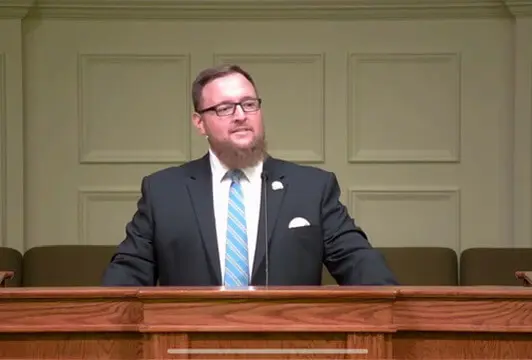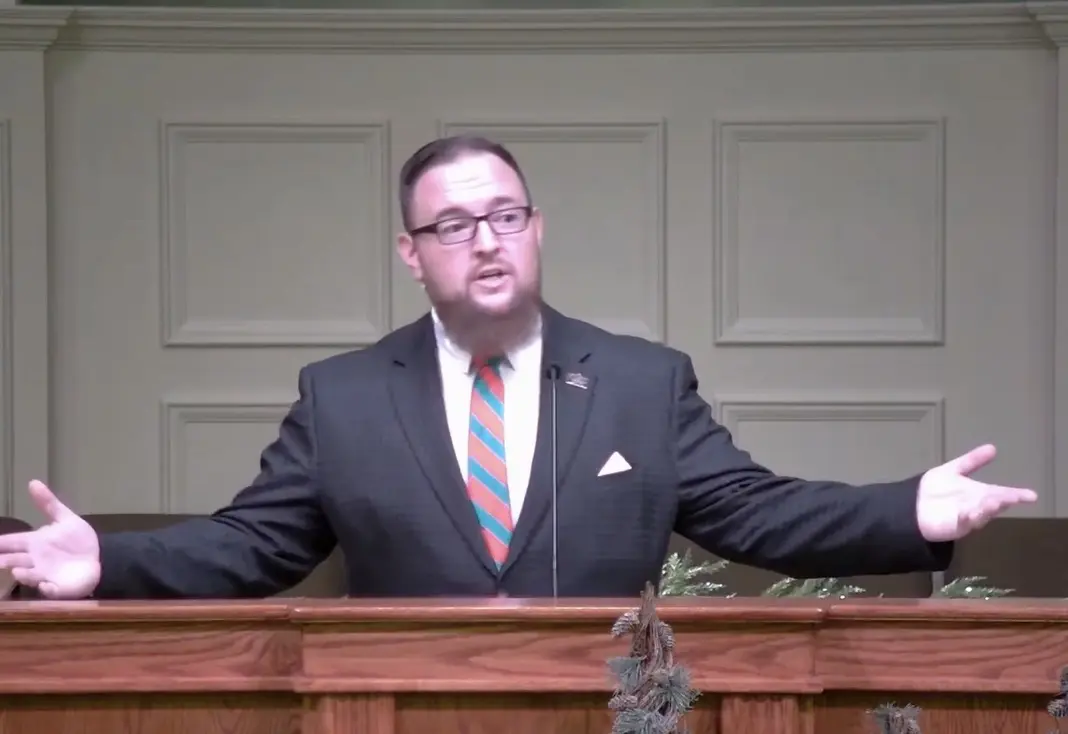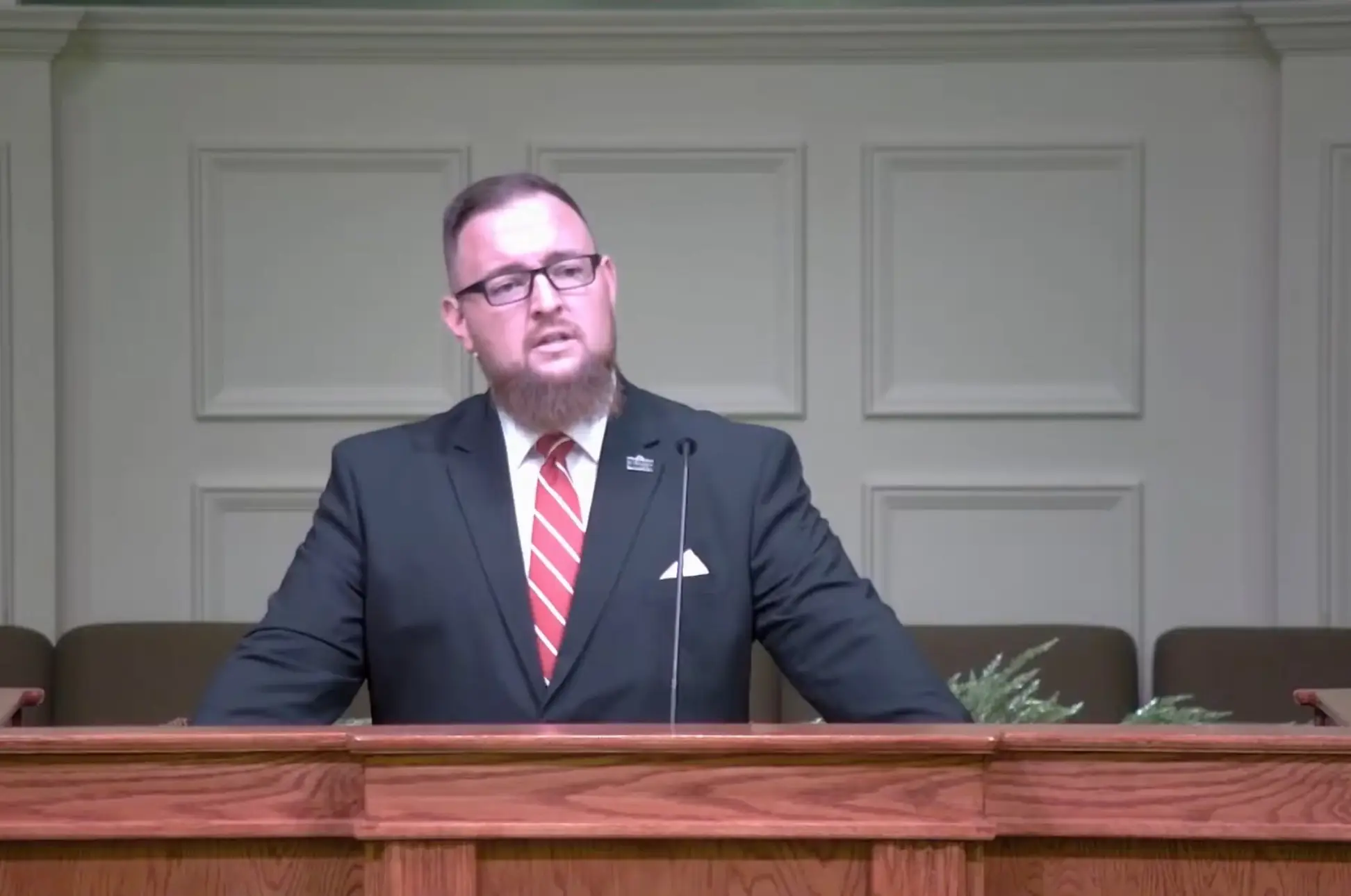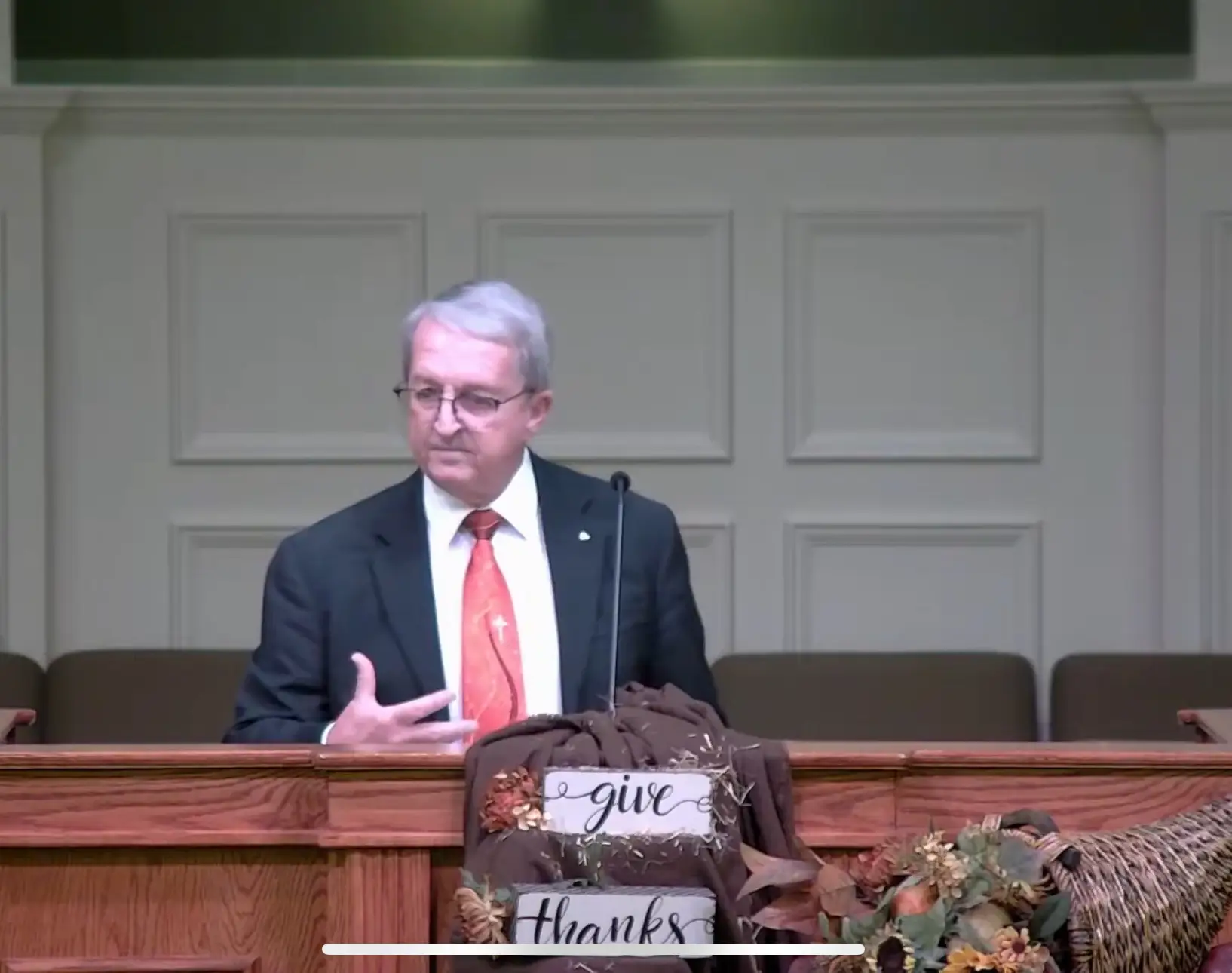Video
“A Mighty Man of Excellence”
Ruth 2:1-3
Pastor Ryan J. McKeen
04/27/2025
Audio
Transcript
Well, turn with me in your Bibles to Ruth chapter 2. Ruth chapter 2.
We finished chapter 1 last week, and so now we come to the second scene in the story of Ruth. And last week we saw the scene really close with Naomi and Ruth returning to Bethlehem. Really the entire first chapter is focused on Naomi. And we’ll notice each chapter focuses really on different characters. So Naomi had gone out from Bethlehem with her husband, Elimelech, and their two sons, and they had gone out full according to Naomi’s description. But she returned empty. And we saw that Naomi was bitter, and she was blaming God for the circumstances in her life, that she had gone out full, but God had emptied me. God had returned me back to Bethlehem empty. And so again, Naomi renames herself. And that’s how we end chapter one.
Naomi has returned and has let all of the townspeople, the ones who were all stirred up that, oh, Naomi’s here. Is this Naomi? And she lets them know that God had dealt severely with her, that she had been stripped of everything good in her life. She didn’t have any reason not to be bitter anymore. So she would be called now bitter because that’s all she has left in life is bitterness. And oh, by the way, Ruth is here too. Here’s Ruth. And you really don’t even hear anything from or about Ruth there at the end of chapter one. And by all accounts, we would assume, if you didn’t know the story already, you would assume that Ruth would stay a background character.
I mean, the last verse of chapter one closes by saying, so Naomi returned, and with her, Ruth, the Moabitess, her daughter-in-law. who returned from the fields of Moab. Now they came to Bethlehem at the beginning of the barley harvest.” So in that last verse, we see really the narrator of this story hinting at Ruth is going to stick around here. We’re learning more and more about Ruth. We keep getting all sorts of detail about Ruth. So even though she seems like a background character, We’re getting a lot of information about this Moabitess. That’s a tag along for Naomi. First, it tells us she was a Moabite woman. We’ve seen that several times. Ruth, the Moabitess. Again, that means a lot in Israel. It means that in an Israelite world, she had little reason to expect the townspeople to accept her and to bring her in as one of their own. Secondly, we see that she was Naomi’s daughter-in-law. So again, the focus is on Naomi and Ruth is a side character. Thirdly, we see there that Ruth was the one that returned from the land of Moab. Although Ruth had never been to Bethlehem before. It says, Ruth the Moabitess, her daughter-in-law, who returned from the fields of Moab.
Now again, this is speaking as a return to somebody who had never been there. But again, the narrator still clearly focused on Naomi. She is the main character. So Naomi’s return is Ruth’s return, because Ruth had tied herself to Naomi. Literally, Naomi was the one who returned empty, but Ruth’s life would be filled. Not only, as we’ll see shortly, with food and a husband and a son. And today we’ll see Naomi and Ruth begin to make a life here in Bethlehem. They’ve left Moab behind and here they are in Bethlehem and they need to figure things out. These two widows, they need to figure life out now that they don’t have men to provide for them and they’re no longer in the country they’d been living in. And that all happens. This making a life, that all happens because of the one who immediately comes into focus when we get to chapter two. So I’m gonna read the first three verses of chapter two this evening, and we’ll see this new character that comes on the scene.
Ruth chapter two verses one through three. This is the word of the Lord. Now Naomi had a kinsman of her husband, a mighty man of excellence, of the family of Elimelech, whose name was Boaz. And Ruth the Moabitess said to Naomi, please let me go to the field and glean among the ears of grain after one whom I may find favor in his eyes. And she said to her, go, my daughter. So she went. And she came and gleaned in the field after the reapers. And it so happened that she happened to come upon the portion of the field belonging to Boaz, who was of the family of Elimelech.
So again, we see the narrator, as any good storyteller does, sets the stage for the things that are about to take place in chapter two. And we see all sorts of information in the first few verses. It’s really listing off information about Boaz and about what happens with Ruth and Naomi. And again, we are introduced to this new character in the story, this new character by the name of Boaz. They’re in verse one. And what do we learn about Boaz here? Interestingly, instead of being introduced by his name and then explaining all the things about him, the narrator here starts with his name and then goes to his family and his status and his significance. And the reason that he does that is he’s trying to get us to focus on Boaz’s importance for this story. The things that would be important later on as we get more into this character, Boaz. He leads with the details that are most important for the story. And what we see here in verse one, it starts with, now Naomi had a kinsman of her husband.
So this man is related to Elimelech. That’s really what that means is he’s a relative. He is a kinsman. So, we don’t really know what that relation was. It could have been a cousin or a brother or something along those lines. He was a close relative of Naomi. We see this mentioned later on in chapter two, verse 20, where it’s Naomi speaking to Ruth about Boaz. And Naomi says to Ruth, the man is our relative. He is one of our kinsmen redeemers. And so he’s a very close relative. In order to be a kinsman redeemer, it really had to be the closest available relative that could perform that task of the kinsman redeemer. And we’ll talk about that later on when we get to the portion where this takes place. But the first thing we see here is he is a relative of Elimelech. Naomi knew who he was. She’d lived in Israel for a long time, and she would have known the close relatives of her husband. And again, the narrator’s point is not just that he’s an acquaintance of Naomi, that he’s a relative, that she knows who he is. The reason this detail is included is because of what will come later. We have to know off the bat that this man is a close relative. That needs to be in the forefront of our minds as we read about Boaz. He is a legal relative of her husband, and that affects a lot of things in the laws they lived under. But again, this small detail to us, the reader, it raises the hopes of the hearers to a familiar Israelite family custom, which we’ll talk about again later.
So that’s what it starts with, that he’s a kinsman. He’s a relative of Elimelech. Second, in verse one, we see that he is a mighty man of excellence. That’s how he’s described, a mighty man of excellence. There’s a lot of things that this could mean. You see the same description is given to Gideon in Judges chapter six, when the angel of the Lord appears to Gideon and tries to muster up a little courage in the guy. And he says, oh, Yahweh is with you, oh, mighty man of valor. while you’re hiding in your wine press and trying to keep away from as much trouble as you can. So that’s the description given. So it’s a superlative description that’s given to Boaz here. He is a mighty man of excellence. Although unlike Gideon, Boaz never fights or he never performs any heroic deeds in this story, but he’s still given this description. So really in this context that we’ll see in this town that these two women have come to, to be described like this, it probably meant he was a man of substance and wealth. He was a well-known man in the community. And we will see later on, he was a righteous man. He’s a man that followed the law of God. So he was a well-known guy. He was a man in that town. The people knew who he was. He had some economic standing there. He was a successful businessman. He was someone who could meet the needs of Ruth and Naomi. He could provide for them. So the intrigue builds as we read this first verse of chapter two, this new stranger that’s come on the scene in the story.
The third thing we see about him is that this man was from the clan of Elimelech. And we already read that he was a close relative of Elimelech. And now we read that he is from the clan of Elimelech. And really, that means the same thing, but the author is trying to highlight it for us. Like, this guy fits. This guy fits the story. So we’re supposed to be noticing Boaz. And again, it might seem insignificant to keep saying that he’s Elimelech’s relative, but for the two widows in Elimelech’s family, it’s a big deal. This is something that they would be looking at as hopeful. And then finally, the fourth thing we read about Boaz in this story is his name. We finally get to his name, which again, Boaz, and it means in the strength of Yahweh. That’s what Boaz means. And we don’t have anybody else in the Bible who’s named Boaz, which is odd. Most names you see in the Bible are repeated somewhere, but Boaz is one who is not repeated. The only other time you see the name Boaz, it’s the name of one of the two pillars in front of the temple that Solomon built. He named the pillars and he named one of them Boaz. Could have been thinking back to the relative of his named Boaz. I mean, we don’t really know, but that’s the only other time you see that name in scripture. And it means, again, in the strength of Yahweh.
So we’re supposed to be seeing this stranger that’s come on the scene as this strong, wealthy, important man of excellence. It gives us an image of who Boaz is. And all that comes in contrast. to Ruth’s late husband. Malon, remember what that name means? Sickly. So first you had Sickly, and now you have In the Strength of Yahweh. I mean, what an upgrade, right? I mean, you could cut the romantic intrigue with a knife at this point. It’s just, this is a juicy story. It’s almost like an Old Testament Hallmark movie. And so the narrator is presenting Boaz in this story as the ideal man for these women. He is dropped right into their lives of these two widows who have lost the ones that would provide for them. And so that’s verse one here of chapter two. And the story continues. Verse one is all description. And then we start with the story in chapter two, verse two. And we see it starts, and Ruth, the Moabitess, said to Naomi, Please, let me go into the field and glean among the ears of grain, after one whom I may find favor in his eyes. And she said to her, go, my daughter.
So here, think about the dialogue that’s happened so far in Ruth, in chapter one. At this point, you almost see the roles reverse. Now Ruth is the one initiating, and Naomi’s responding. She has started to take initiative in her own life. And she’s asking, can I go get to work so I can start to provide for us? Can I make something of this life? So again, for the first time, we see Ruth as the primary actor, and Naomi is reacting to what Ruth has brought up. So again. She approaches her mother-in-law and says what’s on her mind. She wants to go out and she wants to get some food for them. She wants to begin to provide for them. I’m sure when they get back to Bethlehem, by the time they get there, they don’t have much. Then they probably went back to Elimelech’s old property, maybe a house there, but cupboards are pretty bare after you’ve been gone for more than 10 years.
So there’s not a lot that these women have to their name right now. And so Ruth’s like, OK, I got to go make something happen here. We aren’t going to make it if we don’t start bringing something in. And so Ruth takes the initiative. And really, the way this is worded is she’s saying, I think I should go. I think I’m the one that should go out and bring something into this home. And again, something you probably noticed when I read it, it doesn’t just say, and Ruth said to Naomi. No, the author highlights Ruth’s status again. And Ruth, the Moabitess, offered to go and glean and to bring in some income for this family. It’s almost as if the author is saying, remember, Ruth’s a Moabite. Don’t forget that element of the story. She’s a foreigner in this land and everybody knows it. So this is not an easy thing for Ruth to even do. It would be one thing for an Israelite widow to want to go out and try to provide for herself, but a Moabite? Who’s going to let a Moabite in their fields? So again, this is a bit of a risky venture for Ruth, but it also shows Ruth’s attitude in the situation.
Unlike Naomi, Ruth is no victim of her circumstances. Ruth is looking to make a life here. She’s looking to make the best of what God has given them. She’s committed herself to Naomi now, and now she’s seeking to take care of this Israelite woman. And that would be breaking ranks with her people. That would be stepping away from the traditions of the Moabites. Because if you remember what we read about the Moabites before, the Moabites earlier on, they had refused to provide for the people of Israel. Instead, they hired this foreign prophet to come and curse the nation of Israel. And that’s one of the reasons why Moabites were off limits to Israel. Back in Deuteronomy 23, Moses specifically warns the people of Israel to have absolutely nothing to do with Moab.
In Deuteronomy 23, starting in verse 4, it says, because they, speaking of Moab, they did not meet you with food and water on the way when you came from Egypt. And because they hired against you Balaam, the son of Beor, from Pethor, from Mesopotamia, to curse you. Nevertheless, Yahweh your God was not willing to listen to Balaam, but Yahweh your God turned the curse into a blessing for you because Yahweh your God loves you. Now listen to this. You shall never seek their peace or prosperity all your days. That’s Moab. Those are the Moabites. That’s what Ruth is. She’s got a lot on the line to take the initiative to go out into the Israelite fields and try to glean something. This is not the same thing that Elimelech did in Moab. Ruth was born a Moabite and she’d now chosen to become an Israelite. She had chosen to be what Naomi is.
If you remember back in verse 16, she said, don’t press me to forsake you and turning back from following you. For where you go, I will go. And where you lodge, I will lodge. Your people will be my people and your God will be my God. She is committing to be an Israelite. She is being a proselyte, she’s being brought into Israel, and she wants to be one of them. That’s not what Elimelech did. It says in the beginning of chapter one, Elimelech was sojourning. That is, going to live in a land but not becoming one of them. To be a permanent visitor, really, is what a sojourner is. That’s what Elimelech had done. That’s not Ruth. Ruth is becoming an Israelite. So not only was this former Moabite now turned Jewish woman seeking to care for and provide for Naomi, she will eventually, as we get to the end of the story, become the one through whom the royal line continues. That’s Ruth, the Moabitess. And she takes initiative, again, to take care of Naomi, and she asks to go glean among the ears of grain.
Now that word gleaning is important. She’s not asking to go out and be with the harvesters, to go and be hired by some grain farmer to be on his workforce. She’s asking to go glean. Gleaning is different from ordinary harvesting. This was not the grain harvest. It was picking up what was left over. It was picking up the ears that had dropped or the stalks that had been left standing. It’s getting the left, the leftovers in the field, getting what was left. John MacArthur explains this act of gleaning this way. He says, the Mosaic law commanded that the harvest should not be reaped to the corners, nor the gleanings picked up. Gleanings were stocks of grain left after the first cutting. These were dedicated to the needy, especially widows and orphans and strangers. That’s what gleaning is. It’s allowing the needy to come in and take what’s left over. And the righteousness that God expected from Israel was to provide this for the aliens and orphans and widows. And as both an alien and a widow, Ruth certainly qualifies to go gleaning.
But for the same two reasons, she couldn’t count on safe passage in doing this. She couldn’t count on having an easy time going out and gleaning in the fields. Again, so this explains her concern in her request, because she doesn’t just say, let me go glean. She says, after one whom I may find favor in his eyes. She knows she needs protection in order to do this. This is not an easy job, especially for a foreigner and a widow. That’s what she has asked. And again, another element to this story. It’s bad enough on its own and dangerous enough, but think about the timeframe that Israel is in right now. Think about the era of Israel.
They’re in the time of the judges. They were rebuked by God for their lack of compassion and not following the law and taking advantage of the needy. They would not, many of the landowners would not leave the gleanings for the less fortunate. They would harvest everything for themselves. We read about that in the prophets where they’re rebuked for doing that very thing. But here in the time of judges, everyone did what was right in their own eyes. There was very little morality in Israel.
In fact, we just finished the book of Judges with the teens on Wednesday nights. And I’ll tell you, the last few chapters of Judges are a challenge to teach to teenagers. It is not exactly rated PG. There is a lot of nasty stuff that happens in Israel. And if you read at the end of all of the terrible things that happened, Judges 21 verse 24, then the sons of Israel went away from there at that time and every man to his tribe and family. And each one of them went out from there to his inheritance. And in those days, there was no king in Israel. Everyone did what was right in his own eyes. Israel had become so accustomed to wickedness and depravity and immorality that eventually they just shrugged their shoulders and went back to life. It wasn’t a big deal anymore.
In fact, if you go back a few more chapters to Judges 19, I encourage you to read that sometime, the story that takes place in Judges 19. It literally mirrors the account of Sodom and Gomorrah. That’s what happens in Gibeah. The vile people of the town, they see the visitor come in and stay at this house and they are pounding down the door demanding to abuse these new visitors. Except in Sodom and Gomorrah, they weren’t successful because God blinded their eyes and they didn’t abuse any of the new visitors. Here in Israel, in Judges 19, they’re sent a young woman to abuse. And they do, all night, and they kill her. And that’s just a few chapters before where we are at in the Bible right now. So quite literally, Israel had become worse than Sodom and Gomorrah.
That’s the setting Ruth finds herself in as she ventures out on her own to go to the fields. Those are the type of people that live in Israel. Not exactly the safest place for a single woman to be wandering around trying to make a living. But again, nevertheless, Ruth is determined and she sets out to find someone in whose eyes I might find favor. So after these first couple verses, after reading of this mighty man of excellence, and then reading of Ruth’s challenging dilemma, the danger she’s headed out to find a field where she might find somebody who approves of her, the reader’s thinking in the back of his mind, oh, I hope she finds the field of the man of excellence. Wouldn’t that be great? It’s a great story. There’s a lot of suspense. So Naomi hears Ruth’s request, and she thinks it’s a good idea. So she says, go, my daughter.
So Ruth heads out to find someone who will look favorably, not only on her, but on the law of God. She’s counting on the law of God here. She’s counting on somebody in this depraved nation to remember what God’s law says. Verse three, so she went, and she came and gleaned in the field after the reapers. And it so happened that she happened to come to the portion of the field belonging to Boaz, who was of the family of Elimelech. So Ruth goes out. She gleans in the field as she planned. And with all of the drama of her request and the danger that’s intended with it, it just simply says, so she went. It almost disguises the anxiety that Ruth must have had or the danger of the threat of violence that could happen to her. But she was a righteous example of loving kindness. We know that from chapter one. And she was determined. She was determined to provide for not only herself, but for Naomi. And again, we don’t have a lot of detail in the sense that we don’t know how far she walked or what field she went to in the sense that how did she choose what field to go to? Did she choose the one closest to home? Did she choose one that had the least amount of people in it? Did she look for the one that looked the safest?
We really don’t know. Instead, we are focused by the author on this mysterious reason why she ends up in the field she does. It says, and it so happened that she happened to come to this portion of the field. It just happened to happen that way. Again, it’s shifting the focus away from Ruth to her circumstances that are developing here. Again, this literally could be translated, by sheer luck, she came to the portion of the field of Boaz. She just happened to happen upon that field.
Now in English saying that just happened to happen, it sounds ridiculous. It’s no less ridiculous in Hebrew. Like this is supposed to sound ridiculous because it’s emphasizing that it didn’t just happen to happen. It’s supposed to sound ridiculous. It’s a shocking Hebrew translation as well as in English. So again, we know that this is not by chance or by luck. She didn’t just happen into this field, but the author’s using a little bit of sarcasm to get our attention. As you’re reading the story, when you come across it, you’re like, wait a minute. I know that’s not how it happened, but that’s the point. God’s sovereignty is shown.
God’s sovereignty is shown here in the details. First, you see the fulfillment of Ruth’s wish. She finds the field of the one who would look kindly upon her. Second, as we see in the end of verse three, once again, for the third time in three verses, and he just happened to be from the clan of Elimelech. Again, emphasizing the role he could play for these women. He was of the clan of Elimelech. Again, it’s mentioned twice in verse one that he’s a kinsman of her husband, and then he’s of the clan of Elimelech, and then again in verse three here. So again, the author’s trying to highlight something for us when he keeps bringing this up. It’s almost like wink, wink, wink, you know who this is. This guy, he can be the kinsman redeemer. Keep your eye on him. He’s from the line of Elimelech.
But to fulfill God’s divine plan. You think about all the elements that have to align here as Ruth heads out to find a place to make a living here. Well, we know from zooming out and from having the bigger picture that the royal line of David needed to come about, that needed to happen, and it eventually leads to Christ. element of the story, it isn’t present to Ruth yet or to Naomi or to any of them. They don’t know what’s coming down the road. We do. So as we read this story and we see all the pieces aligning, it’s meant to be suspenseful. It’s meant to draw our attention because if she had been to a field where The man was neither gracious or a relative of Elimelech, then it obviously couldn’t happen. The end result of the book of Ruth wouldn’t have happened. Or she might have found a man who was gracious but was not related to Elimelech. That still won’t work.
Or she could find a relative of Elimelech that was not gracious and would mistreat her and shoo away aliens and keep all the harvest for himself. So again, there’s a lot of details here that must happen. He had to be both righteous and graceful toward widows and from the clan of Elimelech. All of these details are coming together in this story. In the providence of God. She meets Boaz. She comes to the field of Boaz. And that’s what we see highlighted in these first three verses of chapter two.
Little does Ruth know, as she sets out, that she’s gonna end up in the field of Boaz. Now, you might assume that she was looking for Boaz, but we are introduced to Boaz in verse one. She still hasn’t met him yet. She’s just heading out. And the clear implication in these verses is that God is directing this. God is pulling the strings. God is aligning these two people and he’s bringing them together the way that he had planned. And that’s how it works in our life. We can look back at our own lives and look at different decisions that we’ve made. Maybe we’ve done the research and we did our homework and we made the best possible choice that we could. Or maybe we just happened into a situation. We didn’t really make the best choice, and if we were looking back and making that decision again, we may not make that same decision. But then again, we look at those times, and we see God working. We see God bringing together maybe things we wouldn’t have chosen, but he brings it together and accomplishes his plan, not only in our life, but in his overall plan.
Would we make the decisions that Naomi and Ruth did? First of all, heading to Moab. Second of all, coming back with Naomi, who doesn’t seem all that happy of a person. No, we may not have, but God still used everything. God can still use sinful situations to bring about his good purpose. And I’m sure we can think of a lot of situations that have come about because of sin. And just because that’s true doesn’t mean God can’t use it, that God can’t still be working in your life and God can’t still be bringing together His plan for your life despite your sinful actions. And Ruth 2, chapter 2 also highlights that oftentimes if it were left to just us, we probably wouldn’t make it. Because there really is no reason why Ruth should have found grace. We know her story. Going out on her own in the fields of people that hated her.
She shouldn’t have made it, but she did because God’s hand was in it. And there’s oftentimes where we don’t even see the protection of God in the elements of our life. That God is always working. God is always bringing things together. Again, Ruth couldn’t have known that she was going to end up in Boaz’s field. And she couldn’t have known that this man would be her future husband. But God knew. And God was working all of these things together. Again, if this book teaches us anything, throughout the whole book, all four chapters, if it teaches us anything, it teaches us that God is sovereign. God is sovereign over all of these circumstances and God provides for his people in order to bring about his will in all things. He often protects us in ways that we are completely unaware of. While we’re called to live our lives according to God’s word, It is God who providentially supplies our needs. And it is Him who protects us and cares for us and brings us through the things that He wants us to experience.
We may not want to choose the life that Naomi and Ruth had. They had experienced severe loss. But God brings good out of it anyways. And that’s what we see in our own lives. God superintends even the smallest details of life. And that’s what we’ll see as we continue in this study of the book of Ruth. We’ll pick up next week on verse four as we see what happens with Naomi in the field of Boaz.
So let’s close in a word of prayer this evening. God, we thank you for your word. We thank you for this story that just continues to highlight and to make obvious to us the way that you work, the way that you are bringing about your plan through these things. And we take courage and we find hope in these things because we know that you are a God who doesn’t change, that you still work this way, that you still are superintending your will in our life despite the way circumstances look sometimes. Lord, we thank you. We praise you for your goodness and your sovereign control over all things. We thank you for who you are. We pray all these things in Jesus’ precious name. Amen.






